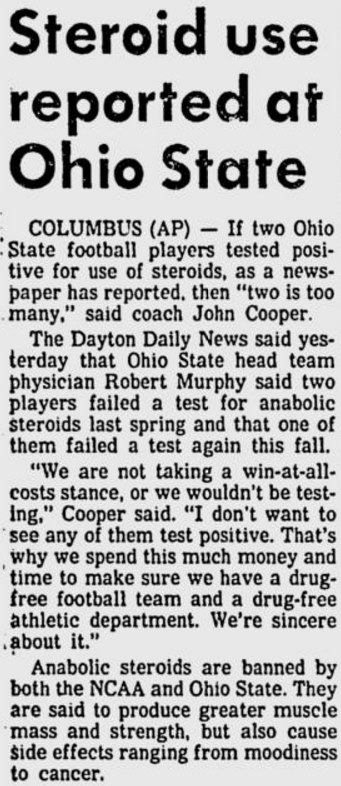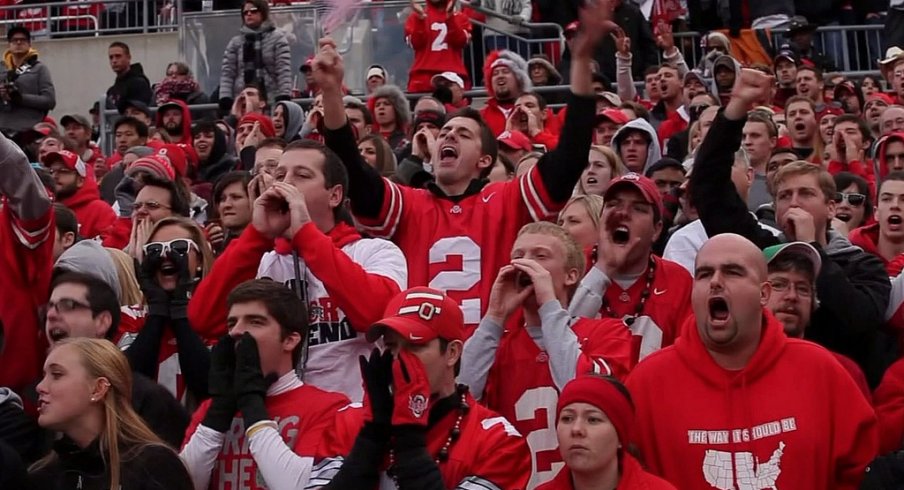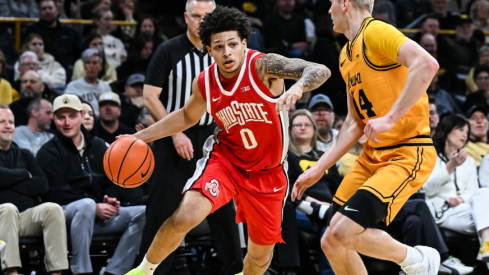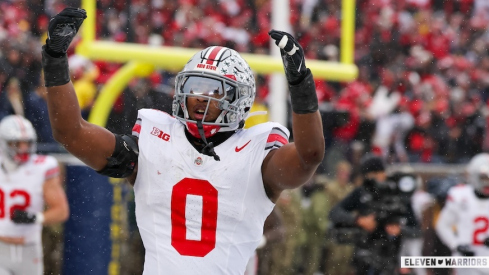Nick Saban has clearly missed getting upset at things in the offseason, because in between conniption fits about satellite camps and having Twitter feuds with Jim Harbaugh, he found the time to complain about drug testing in the NCAA:
The Alabama coach was specifically upset by the NCAA’s testing during last December’s College Football Playoff, citing the fact that those four teams — Alabama, Michigan State, Clemson and Oklahoma — were all subject to testing, while other FBS schools were not.
“If they’re going to test, they should test everybody,” Saban said. “They shouldn’t just test the four teams in the championship … So just because you got into the championship and the playoff last year your guys got tested — so those guys are all getting suspended next year. But how many other guys played in bowl games? It’s not the same standard for everybody.”
Which is a legitimate complaint, albeit one that might have more teeth not coming from a guy sporting the thousand yard stare of someone who just found out that he's got some suspensions coming down the pike. For a victory-obsessed individual like Nick Saban (or Urban Meyer, or literally any other major college football coach), any potential minor pitfall or stumbling block to more championships is the moral equivalent to burning his house down and then inviting your cat to poop on the ashes.
And while most of the time when you hear "violation of team rules"/"failed drug test" you can make a pretty good bet that said violation involves weed and only weed, that's certainly not the only or possibly even the most commonly used drug that a collegiate athlete can get dinged for. I mean, it probably is, but performance enhancing drugs, also known as PEDs, are rampant at all levels of sport, and college football is especially susceptible.
The good news is, if you're a fan without scruples or an athlete yourself, is that the chances of you actually getting busted for PEDs is pretty minimal as long as your name isn't Will Grier. Grier, the Florida quarterback who was suspended for the entirety of the 2015 season for using PEDs, ended up at West Virginia and will sit out the entirety of this season. Sucks for him, but in general it's pretty difficult to get busted for PED use in college football. The Associated Press reported on this extensively in 2012, when they pointed out that:
With steroids easy to buy, testing weak and punishments inconsistent, college football players are packing on significant weight -- 30 pounds or more in a single year, sometimes -- without drawing much attention from their schools or the NCAA in a sport that earns tens of billions of dollars for teams.
Rules vary so widely that, on any given game day, a team with a strict no-steroid policy can face a team whose players have repeatedly tested positive.
...
The sport's near-zero rate of positive steroids tests isn't an accurate gauge among college athletes. Random tests provide weak deterrence and, by design, fail to catch every player using steroids.
That "weak deterrence" is probably something of an understatement. Last year the Wall Street Journal detailed the various punishments that college athletics programs give out for positive tests, and it is a hilarious patchwork quilt of the dumbest possible rules and punishments that their compliance departments could come up with while also satisfying the whims of their head coaches.

Ohio State, for example, requires a suspension of 25% of games for a season for the first offense, with a mandatory dismissal from the team for a second PED offense. Recreational drugs are handled differently, with only a two-week suspension for up to the third offense. Michigan doesn't differentiate (at least on paper) between recreational drugs and PEDs, and as of the third offense the player has their scholarship pulled and they are kicked off the team. Alabama, by the way, declined to reveal their drug testing policies to the Wall Street Journal.
Not that it matters. We really only find out about failed drug tests once a player's status changes, and until then teams can pretty much do whatever the hell they want internally when it comes to discipline until an athlete is injecting Winstrol directly into their eyeballs right in front of the Athletic Director.
For the NCAA's part, here is a quick summary of how their testing regime is implemented during the year. My favorite part is that football teams can get away with 18 "randomly" chosen players to be tested only once a year ("Wow Bryce Haynes, three years in a row? Life sure is weird sometimes"), meaning that at best, a player has roughly a 17% chance of being selected for testing, assuming a roster of 105 athletes. I also really enjoy that someone on the NCAA website wrote approximately 1200 words about the art of testing pee.
It strikes me as a little odd that PED testing and positive results are considered to be almost an afterthought in college sports, whereas at the upcoming Olympics it is an omnipresent concern, and one that's threatening to prevent the entire delegation from Russia from participating unless they can broker an 11th hour deal to keep them in.
I believe that a large part of this discrepancy comes from attitudes about testing in general. There have been repeated, high profile cases of doping at the Olympics, and in many instances have invalidated gold medal results. When that happens, the credibility of the entire enterprise is called into question, and Olympic officials do everything in their power to reverse that image.
In college sports, particularly college football, the occasional Will Grier isn't enough to sway the opinion of many that the testing program as conducted by the NCAA is working to prevent PED usage. Unless there is massive, endemic PED use on a playoff team which gets caught through testing, then people will use that non-evidence as proof that the testing is working.
"Performance-enhancing is not a high priority for me," said Ohio State Athletic Director Gene Smith in 2008. With a lack of high-profile PED incidents among football Buckeyes since then, it's hard to imagine that his attitude has changed considerably in the last eight years.
And maybe it should. Abuse of PEDs are part of what is contributing to the instability of football as a sport, and by effectively turning a blind eye to their use in college, schools like Ohio State and Michigan and Alabama make it harder for the NFL to root out their use in the pros and indirectly encourage their use at the high school level.
Ultimately, when Nick Saban wrings his hands about the drug testing his team was put through, he instead should count his blessings that he coaches in a sport and at a level that takes only the smallest of steps to keep itself clean. That's small comfort to Will Grier, but to the likely other dozen or so of his teammates that didn't get caught, it's job security for both themselves and their coaches.


